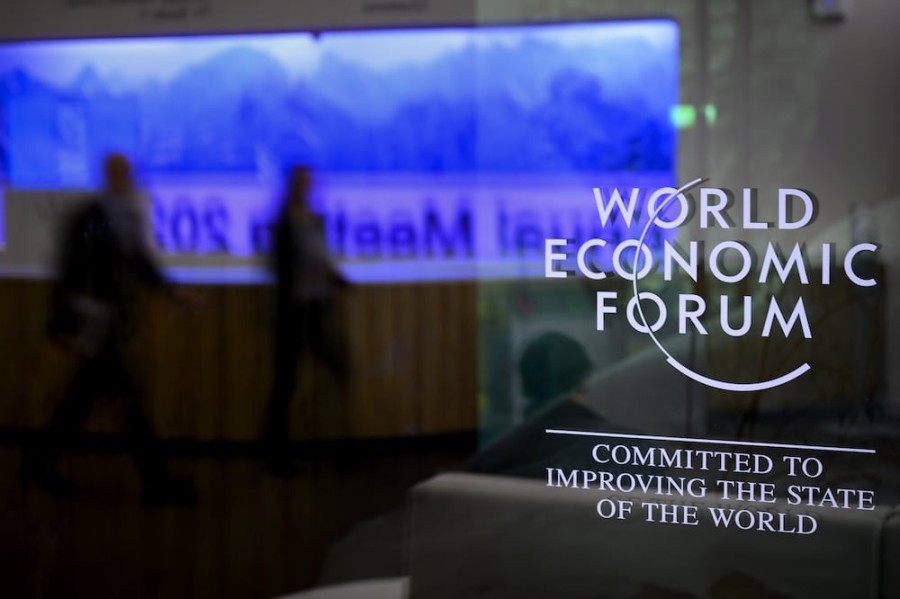Riyadh set to host World Economic Forum meeting amid rising geopolitical tensions

The World Economic Forum’s special meeting on global collaboration, growth and energy for development, scheduled to take place in Riyadh on April 28 and 29, is expected to address global challenges as geopolitical tensions increase.
The meeting will bring together more than 700 participants, including stakeholders from governments and international organisations, politicians and corporate leaders, as Saudi Arabia aims to boost its global profile.
Held under three themes – catalysing action on energy for development, a compact for inclusive growth and revitalising global co-operation – the event aims to bridge the growing North-South divide, which has further widened on issues such as emerging economic policies, the energy transition and geopolitical shocks, the WEF said.
“This special meeting is almost certainly going to be a net positive for Riyadh, as it is hard to see significant downsides to convening a dialogue with prominent global voices.
“However, events alone will not accomplish the government’s ambitious agenda. International investors are increasingly looking beyond splashy, organised events and talking points to gauge for themselves examples of concrete progress and future opportunities in Saudi Arabia.”
The world economy is facing geopolitical shocks, unabating inflationary pressures and central banks’ efforts to keep interest rates at elevated levels to stabilise consumer prices.
After a “surprisingly resilient” 2023, the International Monetary Fund revised global growth slightly higher this year to 3.2 per cent.
The global economy is set to post its slowest half-decade growth in 30 years, with the raging conflict in the Middle East among key downside risks to the outlook, the World Bank said in its Global Economic Prospects report.
Global economic prospects remain subdued and are fraught with uncertainty as more than half of chief economists expect the world economy to further weaken this year, a WEF report said in January.
Key speakers at the WEF’s meeting in Riyadh include Suhail Al Mazrouei, UAE Minister of Energy and Infrastructure; Abdulla Bin Touq, UAE Minister of Economy; Dr Anwar Gargash, diplomatic adviser to the President; Mohammed Al Jadaan, Saudi Arabia’s Minister of Finance; Prince Abdulaziz bin Salman, Saudi Arabia’s Energy Minister; Faisal Alibrahim, Minister of Economy and Planning; and Khalid Al Falih, the kingdom’s Minister of Investment.
Kristalina Georgieva, IMF managing director; Jihad Azour, director of the Middle East and Central Asia department at IMF; Bill Gates, co-chairman of the Bill & Melinda Gates Foundation, and Tedros Adhanom Ghebreyesus, director-general of the World Health Organisation, are also scheduled to speak at the event.
Other notable speakers include Saudi Aramco’s chief executive Amin Nasser, Ahmed Galal Ismail, chief executive of Majid Al Futtaim Holding, and Laurence Fink, chairman and chief executive of global asset manager BlackRock.
“While the economies of most developed nations have surpassed pre-pandemic levels, many emerging markets are unable to keep up. Geopolitical upheavals, notably the conflicts in Ukraine and Gaza, have cast a shadow over the trust and mutual understanding vital for a safe and stable future,” the WEF said.
“In recent years, governments have revisited their economic models. As a result, new industrial policies have come to light, including a surge in protectionist measures, screenings of new investment frameworks and the restructuring of supply chains.”
The WEF said that a trajectory towards a more fractured global economy is emerging.
Also, in the pursuit of an energy transition, leaders are grappling with the delicate balance between allowing emerging markets to pursue their growth trajectory while limiting greenhouse gas emissions, the organisation added.
The WEF’s special meeting seeks to drive solutions-orientated action to advance collaboration on critical areas for development and more inclusive global growth.
Speakers will explore solutions to bridge the growing North-South divide, drive inclusive economic development, a sustainable energy transition and more equitable technological advancement.
The WEF sessions will focus on digital currencies in the Middle East, equitable energy transition, banking amid uncertainties, education and AI, financial technology, the economic promise of space, smart cities and innovating for social impact, among others.
The special meeting will convene cross-sectoral actors to identify financial, technological and policy solutions aimed at scaling up the use of clean energy solutions while also ensuring equitable growth, according to the WEF.
It will also identify the partnerships and actions that can help to contain the widening ripple effects of geopolitical instability, in the Middle East, most notably the conflict in Gaza, and build a more resilient global economy.
Tags :
Previous Story
- Middle East military burden is world's highest in...
- Abu Dhabi’s non-oil foreign trade jumped 8% in...
- Unlocking Opportunities in the Thriving China Business Landscape
- Oil posts second weekly gain on US economic...
- Will India emerge as a global economic powerhouse...
- Nikkei rises 28% in 2023 for highest year-end...
- UAE Central Bank raises 2024 growth forecast for...
- US manufacturing mired in weakness, economy heading for...